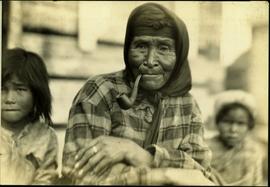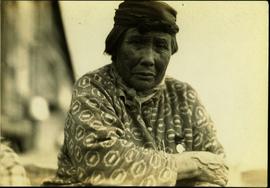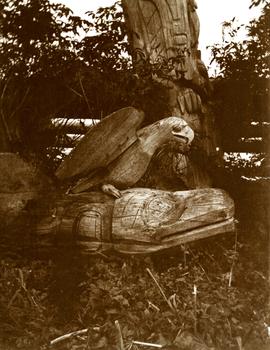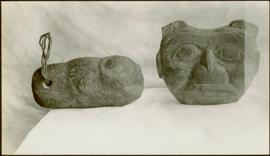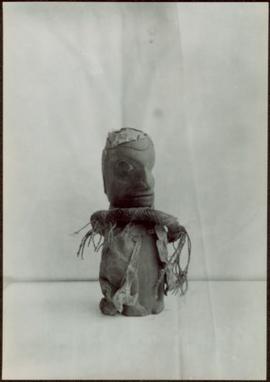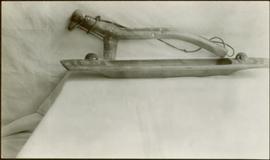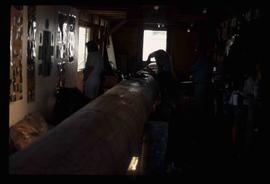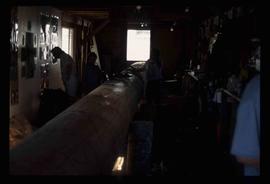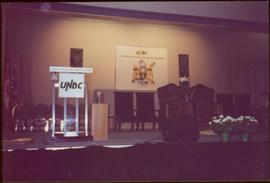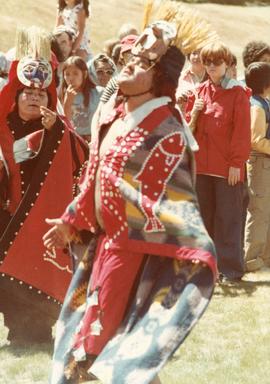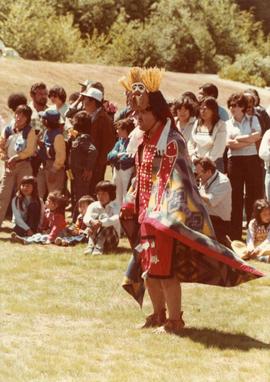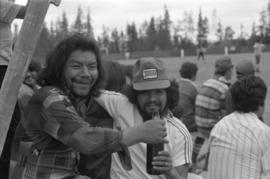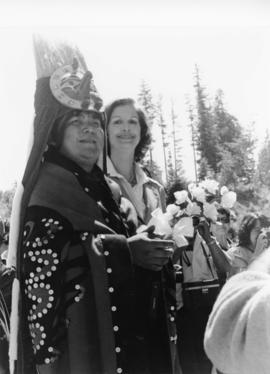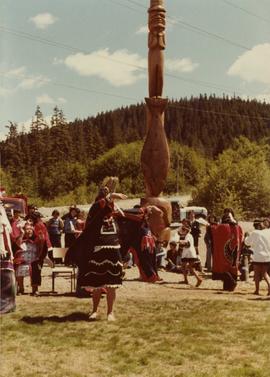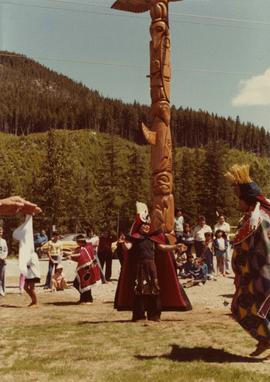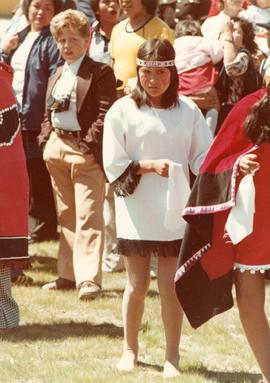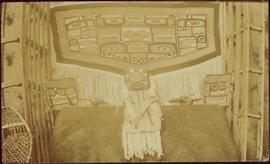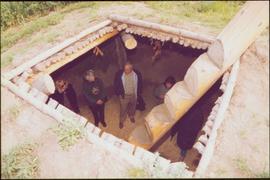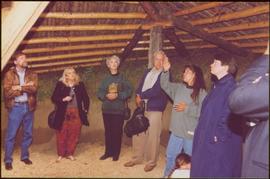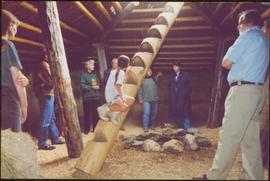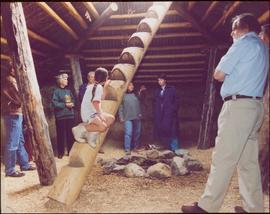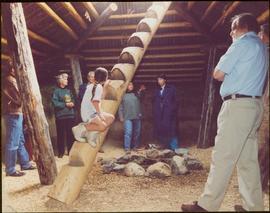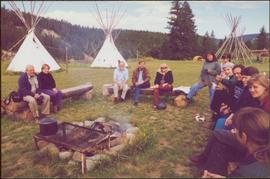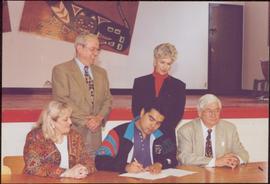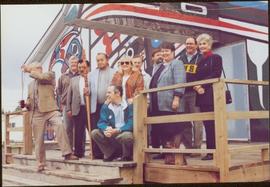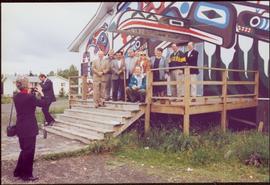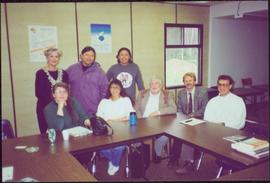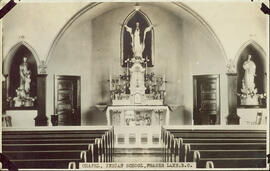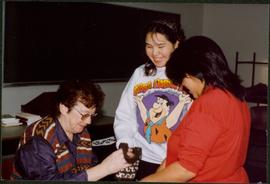Collection consists of a set of 4 Carrier language audio recordings from a UNBC class, a set of 4 audio recordings from the Carrier Language Translation Project, a Carrier dictionary, and Carrier language publications.
Linden, CarolynTyped annotation on recto: "Tachi Village Indians (Carrier Tribe) Stuart Lake, B.C." Close up of an older woman with a small child on either side. The woman is smoking a pipe, and unidentified buildings can be seen in background.
Close up of Elder First Nations woman in front of unidentified building. Typed annotation on recto: "Carrier Indian Squaw at Tachi Village Stuart Lake Section - B.C."
Carvings sit among bushes in front of what appears to be a totem pole.
Handwritten annotation on verso reads: "Eagle & whale Monument Tanu".
Carved stone figure on left features a hole at one end through which a rope is strung; while the figure on the right is a soapstone figure carving of a face with two ears to the sides and split ‘u’ ones at the top of the head. Handwritten annotation in pen on verso reads: “W.E. Collison.” Stamped annotation on verso reads: “Department of Mines and Resources, Photographic Section. Oct. 6, 1939”. Numeric annotation on verso: “51-5”
Carved wooden sculpture of a seated male figure - his hands on his chest wearing a headdress and a neck ring. Stamped annotation on verso reads: “Department of Mines and Resources, Photographic Section. Oct. 6, 1939”. Numeric annotation on verso: “46-3”.
An unidentified carved wooden tool or utensil with twine attached, leans against a sheet covered wall behind a carved wooden platter. Stamped annotation on verso reads: “Department of Mines and Resources, Photographic Section. Oct. 6, 1939”. Numeric annotation on verso: “50-3”
Image depicts several unidentified individuals inside a building, one of which is carving a totem pole. The location is uncertain.
Image depicts several unidentified individuals inside a building, one of which is carving a totem pole. The location is uncertain.
File consists of a conference paper by Weller titled "Cascadia: Regional Trade and Separatist Politics." This file was originally numbered to correspond with conference paper number 87 listed in Weller's CV.
File consists of catalogue records for publications related to autobiographical histories of Aboriginal peoples and a photocopy of the monograph, "Kohkominawak Otacimowiniwawa: Our Grandmothers' Lives, as Told in their Own Words."
File consists of catalogue records for and excerpts and articles about the history of Aboriginal peoples, ethnobotany and Aboriginal and a schedule from the Fifth North American Fur Trade Conference.
File contains material about and by Charlotte Selina Bompas. It consists of notes on Bompas, catalogue records for publications about Bompas, a photocopy of Bompas's memoirs, search results for archival material and excerpts from publications on Bompas.
File contains material by and about Martha Johnson. It consists of a printout of a biography, a description of a publication, catalogue records and a report from a pilot project, entitled, "Traditional Dene Environmental Knowledge."
File contains material by and about Nancy Turner. It consists of printouts of catalogue records and search results, bibliographies, a printout of curriculum vitae, a biography, descriptions of publications and excerpts from publications.
File consists of catalogue records of and excerpts from ethnobotany publications on traditional Dene medicine and the medicinal uses of North American plants and herbs in the Canadian arctic and a listing of correspondence from the Mildred Trotter papers.
File consists of proceedings from presentations of "Science lessons for everyone? The writings of Catharine Parr Traill, 1802-1899" and "Colonial Lessons: Catherine Parr Traill (1802-99) and popular science education in Upper Canada"; other material on Catharine Traill; and an abstract for an article on the life of Madeline (Mach) Izowsky, a Polish immigrant who spent most of her life in Prince George.
File consists of proceedings and drafts of a presentation of "Science lessons for everyone? The writings of Catharine Parr Traill, 1802-1899."
Item is a recording of an audio segment from CBC Radio in which a documentary update is provided on the inquest of Coreen Thomas.
Audiocassette Summary
Scope and Content:
- Update on the case of deceased Coreen Gay Thomas
- July 3, 1976 Coreen Thomas is struck and killed by a car walking out to the Stoney Creek Reserve
- Police Report blamed Coreen for causing the accident saying that she was involved in a game of chicken
- The Driver of the car, Mr. Redekopp, had a high blood alcohol content but was not blamed for the crash
- Indians claimed that they were frequently harassed on the road by white motorists
- An inquest occurred and focused on relations between Indians and Whites
- Redekopp, coroner, police detachment, federal department of Indian affairs all seemed to be on trial
- Vanderhoof residents state media coverage is sensational with Vanderhoof unfairly labeled as “the most racially troubled town in Canada”
- Some see problem as due to lack of activities for young people in small communities
- Stoney Creek Indians live in intolerable conditions
- Interview with Stoney Creek Reserve resident regarding sanitation problems; lack of proper sewage system; cases of tuberculosis; high rate of unemployment; she states DIA should be responsible and should come up with a solution
- Problem with the perception of an alcoholic society;
- Archie Patrick, FN leader talks about the prejudice, harassment and racism found in Vanderhoof and other Northern communities towards Native People
- Good things could come out of this inquest – Vanderhoof residents should learn about poor living conditions at Stoney Creek
- Reporter provides update on the inquest; that local Police were accused of intimidating the witnesses
- Coreen Thomas’ death was unnatural but accidental
- Redekopp was negligible because vehicle was going too fast
- Segment of interview with Harry Rankin on the Thomas’ inquest; questions on the state of fairness of the inquest; and the state of white-native relations in northern BC
- Inquest Findings: Measures that should be put into place: Upgrade emergency system in the area, no person be placed in morgue before death certificate is in issue, get resident doctor for hospital, breathalyzers taken as soon as is legally permitted, RCMP officers be encouraged to have parent or guarding present when questioning young people as witnesses, Stoney Creek Band Council and Vanderhoof Council work to establish a Friendship Centre
Documentary ends with interview of Sophie Thomas on need for a change in white-native relations – and ends with excerpt of music from the Vanderhoof ‘pioneer’ song.
End of Tape
Item is a recording of an audio segment from CBC Radio in which CBC Reporter Karen Tankard provides a documentary report on the CBC Radio program Daybreak on conditions on the Stoney Creek reserve, outside of the farming community of Vanderhoof, 15 years after the inquest into Coreen Thomas’ death in Stoney Creek, BC. Tankard interviews community residents about the inquest and discusses the state of racism in the town of Vanderhoof, BC in 1991 and concludes improvements have not been made.
Audiocassette Summary
Scope and Content: Tankard recalls that Maclean’s Magazine had written at the time of the inquest that “Vanderhoof was one of the most racially prejudiced towns in BC”
Tankard recalls Inquest of Coreen Gay Thomas’ death and includes archived interviews from the 1976 inquest. One Vanderhoof woman says people are putting “racial connotations’ around what is going on in Vanderhoof and that she has ‘many friendships’ with native people that ‘is not unusual’ While Minnie Thomas, a Band Councillor in 1976, discusses how poor white-native relations are on reserve and criticizes the state of housing and the economy on the Stoney Creek reserve
Tankard then talks to students at a dance on the reserve on Sept 15, 1991; she notes there is no high school for the native students. Native student Kevin Prince notes that “white kids don’t like native kids…”
Jackie Thomas who works at the Band Office states that the feelings of racism still exist here in 1991 Yet Vanderhoof Alderman Jack French states that he “doesn’t see it” in Vanderhoof now. Tankerd notes that Native people recall that the Inquest “shamed” the federal government into making some changes – some municipal services now exist and roads are paved in Stoney Creek, yet there is still 80% unemployment and a rise in drug and alcohol abuse. Gordon Smedley, editor of the Nechako newspaper discusses white-native relations 15 years after the inquest – and argues that a ‘core group’ of drug users impacts the image of natives in the community
Stoney Creek Elder Mary John argues that racism still exists and refers to how in the case of one native woman, who was a university graduate that she could not get even a clerical job in Vanderhoof
Vanderhoof resident Hugh Millard – argues that native residents from Stoney Creek are “not hampered by prejudice, but by a lack of education”
Bruce Smith, high school principal, expresses the challenges of keeping native kids in school; that activities have focused on liaison work with the Band. Smith notes the creation of the Yinka Dene Language Institute as means to keeping native students in school - seen as a ‘storefront’ school for adult education
Tankard notes RCMP also attempting to make changes and have hired a native constable
Yet Alderman Jack French notes there is not a lot of contact between the municipal council and the Stoney Creek Band Council – however argues that the municipality has avoided getting involved in such issues – “not our mandate” – the municipality’s mandate is to provide municipal services only.
Tankard recaps the findings of the Inquest – and questions if anything has really changed in Vanderhoof and Stoney Creek since the inquest.
While she recalls that Richard Redekopp was charged with criminal neglect that resulted in Thomas’ death – that due to a lack of evidence he was not convicted
Tankard surmises that perhaps the hope of the inquest that a reunion of white-native community in Vanderhoof and Stoney Creek was ‘too much’ and ‘unachievable’
End of documentary report by Karen Tankard
The Daybreak female radio broadcaster (unidentified) then invites Talk Back listeners to call in on the issue…..
End of tape
File consists of an oral history given by Cecil Nicholls, which was gathered as part of Dr. Mike Evan's Island Cache Recovery Project. Includes consent forms, transcripts, and the recorded oral history on the original media.
File contains slides that reproduce historical photographs of Indigenous peoples of Central Interior, as well as maps.
Stamped annotation on verso reads: "MAY 1994".
Photograph depicts a ceremonial dancer in front of crowd wearing a colourful button blanket and headdress at the opening of the Haisla Recreation Centre in Kitamaat Village.
Photograph depicts a ceremonial dancer wearing a colourful button blanket and headdress at the opening of the Haisla Recreation Centre in Kitamaat Village.
Photograph depicts First Nations men enjoying a drink at a sporting event.
Photograph depicts a ceremonial dancer wearing a button blanket and headdress with Iona Campagnolo at the opening of the Haisla Recreation Centre in Kitamaat Village.
Photograph depicts ceremonial dancers in a crowd by a totem pole at the opening of the Haisla Recreation Centre in Kitamaat Village.
Photograph depicts ceremonial dancers in button blankets and headdresses near a totem pole at the opening of the Haisla Recreation Centre in Kitamaat Village.
Photograph depicts a young ceremonial dancer wearing white at the opening of the Haisla Recreation Centre in Kitamaat Village.
Photograph features an arranged collection of Chief’s ceremonial regalia: Chikat robe and Amalayt (headdress), two carved wooden rattles and two leggings.
Handwritten annotation in pen on recto reads: “Qush ahlied (?) or Chilcat [sic] Robe worn by Chiefs when entertaining. Also 'Ahm Ahlied'(?) or Head Ornament Indian Coronet and leggings." Verso also has additional handwritten annotations which have been crossed out.
View from above; unidentified woman also visible with the group. Photograph taken during the chancellor's tour of Xats'ull Heritage Village, Soda Creek First Nation, Williams Lake, B.C.
Unidentified woman stands third from right, with arm raised. Photograph was taken during the chancellor's tour of Xats'ull Heritage Village, Soda Creek First Nation, Williams Lake, B.C.
Two unidentified woman are also visible with the group, on far left and in centre with arm raised. Young girl sits on post in foreground. Photograph was taken during the chancellor's tour of Xats'ull Heritage Village, Soda Creek First Nation, Williams Lake, B.C.
Unidentified women stands in centre background with arm raised, and a young girl sits on post in foreground. Photograph was taken during the chancellor's tour of Xats'ull Heritage Village, Soda Creek First Nation, Williams Lake, B.C.
Handwritten annotation on verso reads: "UNBC 1992".
Unidentified women stands in centre background with arm raised, and a young girl sits on post in foreground. Photograph was taken during the chancellor's tour of Xats'ull Heritage Village, Soda Creek First Nation, Williams Lake, B.C.
Left to right: Charles Jago and unidentified woman, David Fish, Dennis Macknak, Deborah Poff, unidentified woman and child, Iona Campagnolo, Lee Morrison, Ellen Facey, two unidentified women. Teepees visible in background. Photograph was taken during the chancellor's tour of Xats'ull Heritage Village, Soda Creek First Nation, Williams Lake, B.C.
Photograph features UNBC Provost Deborah Poff, UNBC President Dr. Charles Jago, an unidentified man, Chancellor Iona Campagnolo and Reverend Ian MacKenzie signing papers. Photograph was taken during the chancellor's tour of Nass Valley, ca. 1992.
Group features Charles Jago, Mike Hammar, Jacob McKay, Bert McKay, Deborah Poff, Alex Michalos, Dennis Macknak, Margaret Anderson, David Fish, Dean Doug Nord, Fred Beil, and Chancellor Iona Campagnolo. Photograph was taken during the chancellor's tour of Nass Valley, ca. 1992.
Group features Charles Jago, Mike Hammar, Jacob McKay, Bert McKay, Deborah Poff, Alex Michalos, Dennis Macknak, Margaret Anderson, David Fish, Dean Doug Nord, and Fred Beil. Photograph was taken during the chancellor's tour of Nass Valley, ca. 1992.
Chancellor Campagnolo stands with five unidentified Quick Start students, Fred Gilbert, and Nick Petraryszak. Photograph was taken during the chancellor's tour of the Peace-Liard Region, 1993.
File consists of a conference paper titled "Change and Development in the Australian Intelligence Network" presented by Weller at CASIS, Brock University, 2-4 June, 1996. This file was originally numbered to correspond with conference paper number 95 listed in Weller's CV.
File consists of a conference paper titled "Change and Development in the New Zealand Security and Intelligence Services" presented by Weller at WSSA, San Diego, 26-30 April 2000. This file was originally numbered to correspond with conference paper number 108 listed in Weller's CV.
Interior photograph of a church. Printed annotation on recto reads: “Chapel, Indian school, Fraser Lake B.C.”
Consists of 1 edited and revised early draft of chapter for Prospering Together. Initial paper--which was subsequently heavily revised--was written by Lee G. Morrison and David Fish, and was entitled "Land Claims Settlement and the Devolution of Control of Health Services: The Health and Economic Report".
Consists of 1 later draft of chapter for Prospering Together, entitled "Chapter 7: Unlocking the Medicine Chest: the Implications of Transferring Control of Health Services to First Nations." Also includes 1 Laurier Institution brochure entitled "The Challenge of Diversity," and 1 cover letter. Cover letter, from Ann G. Roberts, Executive Assistant, Laurier Institution, asks Dr. David Fish to amend submitted chapter and then approve the final version for publication.
Photograph depicts Moran seated to left of two students presenting small knitted craft. Desk and chalkboard in background. Photograph was taken at session of Aboriginal Women's Training Program at the Cowichan Campus, Malaspina University College, in Duncan B.C. Handwritten annotation on recto of photograph: "Gifts from Charlene + Joanne Smith".
File consists of printed webpages with information about Cheryl M. Bartlett and her research.
File consists of documents, a newspaper clippings, and summaries surrounding the surrender of the Cheslatta Reserve on April 21, 1952. Highlights include:
- Chief Marvin Charlie, "The Story of the Surrender of the Cheslatta Reserves on April 21", 1952 (document)
- Mike Robertson (compiler), "Ootsa Lake Settlers: Sale of Land to Alcan, 1950-54", 1991 (draft document)
- Cheslatta Band, "Cheslatta Redevelopment Project Executive Summary", [after 1990] (booklet)
File consists of an oral history given by Chester Jeffery, which was gathered as part of Dr. Mike Evan's Island Cache Recovery Project. Includes consent forms, transcripts, and the recorded oral history on the original media.
